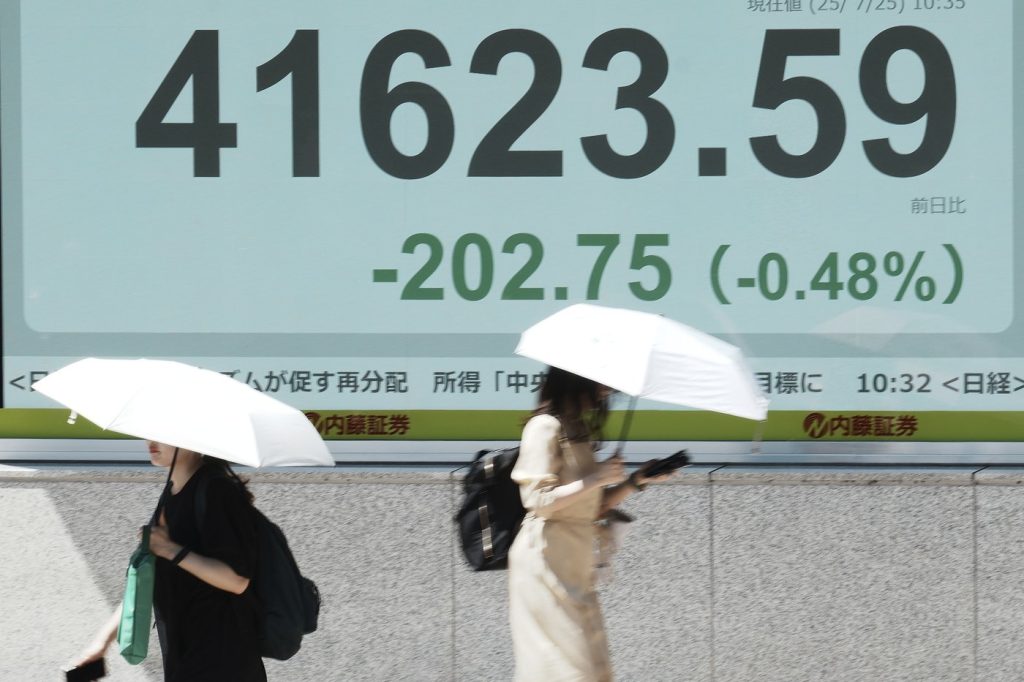MANILA, Philippines (AP) — Asian shares experienced a downturn on Friday as Wall Street's gains reached new heights buoyed by Alphabet and artificial intelligence stocks. This growth managed to counterbalance a significant drop in shares of electric vehicle manufacturer Tesla.
The Nikkei 225 index in Japan fell by 0.7% to close at 41,511.09 after two consecutive days of positive performance. This decline followed U.S. President Donald Trump’s announcement of a new trade deal imposing a 15% tax on imports from Japan, which is notably lower than the previously threatened 25% rate expected to take effect on August 1.
Inflation data from Tokyo revealed a year-on-year increase of 2.9% in July, slightly down from June's 3.1%. Analysts from ING Economics noted that the Japanese government's measures to temper inflation appear to be effective, although they cautioned that underlying price pressures in Tokyo remain high. Consequently, they predict that the Bank of Japan will maintain its interest rates during the upcoming meeting on July 30-31, while likely revising its inflation forecasts upward.
In other Asian markets, Hong Kong's Hang Seng index reported a loss of 1.1%, closing at 25,383.07, while the Shanghai Composite index slid by 0.3% to 3,593.38. Meanwhile, South Korea’s Kospi index rose by 0.3% to 3,199.91, and Australia's S&P/ASX 200 experienced a drop of 0.4%, ending at 8,673.80. Taiwan's Taiex index fell by 0.1%, and India’s Sensex also decreased by 0.1%.
The previous day, Wall Street saw the S&P 500 inch up by 0.1%, closing at an all-time high of 6,363.35. The Dow Jones Industrial Average, however, declined by 0.7% to finish at 44,693.91, while the Nasdaq composite gained 0.2%, ending at 21,057.96. Alphabet saw its stock climb by 1% after reporting a stronger-than-anticipated quarterly profit, with plans to increase investment in artificial intelligence technology by $10 billion, bringing their total budget to $85 billion.
This positive trend for Alphabet positively impacted other stocks in the AI sector, particularly Nvidia, which rose by 1.7%. As the largest company on Wall Street by market value, Nvidia was a significant contributor to the S&P 500's gains. Conversely, Tesla saw an 8.2% drop in its shares. Despite reporting quarterly results that met or exceeded analysts' expectations, concerns regarding CEO Elon Musk's political ventures, which may alienate potential customers, weighed heavily on investor sentiment. Musk indicated that the company might face several challenging quarters ahead due to a significant loss of incentives in the U.S. market.
Investors have been optimistic in recent weeks, driven by the hope that President Trump will negotiate trade agreements that would lower hefty proposed tariffs. However, there remains a palpable risk of recession and rising inflation resulting from these tariffs.
In commodity markets, U.S. benchmark crude oil prices increased by 13 cents to $66.16 per barrel, while Brent crude, the international standard, rose by 12 cents to $68.48 per barrel. The U.S. dollar strengthened slightly against the Japanese yen, trading at 147.21, compared to the previous day’s 147.00. The euro fell to $1.1737 from $1.1748.










